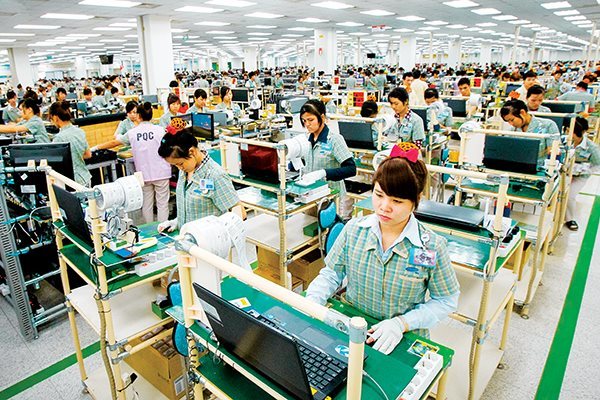Analysts say Vietnam’s supporting industries are seeing new opportunities as orders have increased and the capital continues to flow into Vietnam.
In recent months, CNC Tech, a company with factories in Binh Duong and Vinh Phuc provinces which specializes in making precise prototypes, has been running at full capacity as the number of orders has soared.

Nguyen Van Hung, director of CNC Tech, said previously the company’s clients were mostly Japanese companies. But now, orders are coming from the US and Europe as well. The increase in number of orders, according to Hung, is attributed to the US-China trade war.
Vietnam is believed to benefit from the trade war as the capital is redirected to Vietnam instead of China and more orders placed with Vietnamese enterprises instead of Chinese. This is a great opportunity for Vietnam’s supporting industries.
| Vietnam is believed to benefit from the trade war as the capital is redirected to Vietnam instead of China and more orders placed with Vietnamese enterprises instead of Chinese. This is a great opportunity for Vietnam’s supporting industries. |
As the director of an enterprise with 34 years of operation in the field related to trade connections, Vu Trong Tai, CEO of Reed Tradex Vietnam, can see strong development and high demand from domestic enterprises for equipment imports.
“More than 11,000 people came to the exhibition on supporting industries organized by us this year, an increase of 40 percent over last year,” he said.
Vietnam’s supporting industries, which began from zero in 1990s, have gained initial achievements. Many Vietnamese enterprises have successfully joined global supply chains and have close connections with foreign invested enterprises (FIEs).
According to Choi Joo Ho, general director of Samsung Vietnam, it is expected that the number of first-class vendors of Samsung will rise to 42 this year end from 35 in 2018, while the number will be 50 by the end of 2020.
“Some years ago, when Samsung arrived in Vietnam, Vietnamese enterprises could only provide packaging and make printing works. Now, they can undertake many other works in the supply chain, especially in equipment automation,” Choi said.
However, Vietnam’s supporting industries remain fledgling, especially compared with Thailand's, according to Tai of Reed Tradex Vietnam.
The localization ratio of Thailand’s automobile industry is 60-70 percent, while the figure for Vietnam is just 7-10 percent.
The competitiveness of Vietnam’s supporting industries is still low compared with other regional countries. A report from the World Bank showed that Vietnam’s private enterprises still cannot connect to the foreign invested sector. Vietnam mostly undertakes work in the final assembling stage of the value chain.
Regarding the quality of local suppliers in the global competitiveness index, Vietnam ranks 109th out of 138 ranked economies, after the Philippines (74th), Thailand (77th) and Malaysia (22nd) in the World Bank report.
According to theh Ministry of Industry and Trade (MOIT), Vietnam has 1,800 enterprises in supporting industries across the country.
Thanh Lich / Vietnamnet